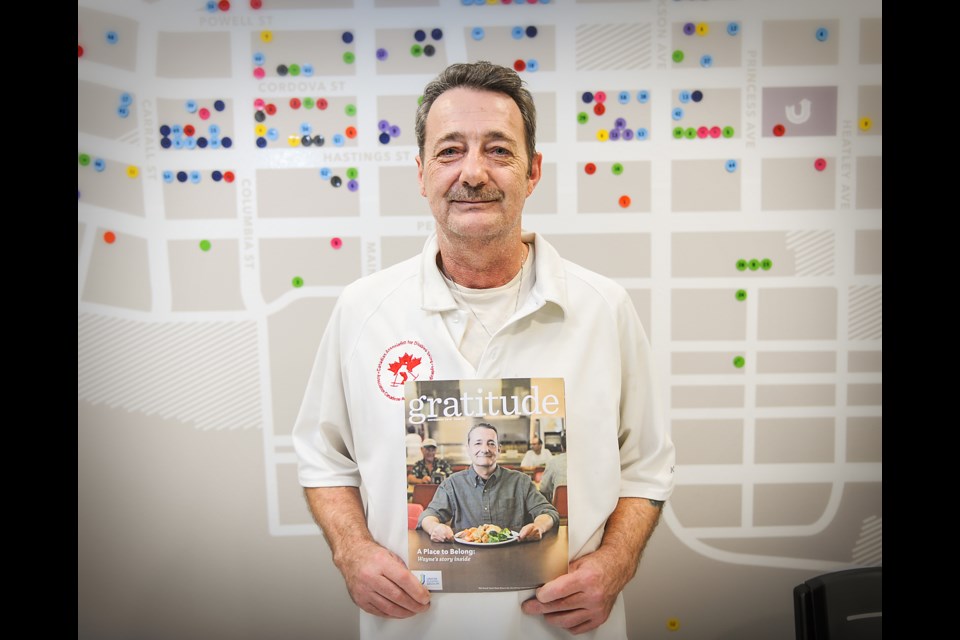Wayne Rideout knew he needed help, but he didn’t have the faintest idea how to go about it.
He was living underneath an overpass to the New Westminster Quay, and each day was unbearingly the same as the one before; collecting enough empties to buy booze, drink all day, wake, and repeat.
“Drinking — it’s a big, mean problem,” said Rideout on a break from his job in the kitchen at Vancouver’s Union Gospel Mission on Saturday, which happened to be the day of the organization’s 74th annual Christmas Dinner.
“It’s beside your bed before you even get up, you can’t do anything without it. For over 50 years, it was the drinking. I knew for a long time that I had to do something about it.”
Rideout knew about shelters but figured they were like what he had seen in television shows — dank and cramped. For a man who didn’t like to talk much, the idea of sleeping and recovering in a room filled with bunk beds didn’t appeal in the slightest so it was on the streets he stayed.
One of life’s tragedies is the kid who never had a chance to realize their potential due to poor circumstances. Rideout was raised by a single mother, and moved from one place to another.
Sometimes homes were garages, lit and warmed by way of an extension cord plugged into a neighbour’s house. There was always a party and a party’s accruements. With his older sister involved with a biker gang, it meant Rideout didn’t have any semblance of good role models.
“I was eight years old when I started drinking and nine or 10 when I was doing the drugs,” he remembered. “To me, it was normal. It was the way it was.”
Rideout, now 58, quit drugs in his early 20s but turned to them again during a spiral of grief when his mother and one of his brothers died within three weeks of one another. He was on the streets in a haze but managed to survive by utilizing one of his many talents, knitting slippers and selling them. He learned to knit at the same age he learned to drink; the former was helping him survive while the latter was killing him.
Regardless of where Rideout worked, whether it was in a restaurant or the auto bodyshop, he said he always worked hard but was so insecure about his illiteracy that he would quit at the slightest whisper of a promotion for fear it would require reading and he would be found out.
“I started out in the shop just sanding but I ended up doing everything. I can pick things up quickly and I like learning the whole thing when I do something. I’m a jack-of-all-trades,” he said. “A lot of places I worked at, I would quit because I couldn’t spell and I didn’t feel comfortable with that. The bodyshop, that was easy, because everything was done in abbreviations.”
It wasn’t even two years ago when Rideout went for a walk in New Westminster and bumped into a fellow homeless man by the name of Jo. The men got talking, the topic of food came up, and Jo brought Rideout to dinner at the East Hastings UGM.
Rideout chatted with outreach workers during dinner and, when it was time to leave, he didn’t follow Jo back to New West. He opted to stay in the UGM emergency shelter for two nights before deciding to enroll in the in the alcohol and drug recovery program.
“For me, when I came in, it was about being able to talk to somebody and have somebody who listened to you who wasn’t saying, ‘Oh, you’re just a drunk.’ That’s what took off for me,” he said. “It took a couple months but I ran into people my age in the program and that helped. I didn’t like talking and I didn’t want to speak up or nothing at first. Now, they can’t shut me up.”
Rideout opened a garbage bag that was sitting on the table in front of him to show off dozens of colourful slippers. He’s still knitting but with a different reason from when he started his path to recovery 19 months ago. Instead of using the proceeds for his own survival, he said his goal is to have the proceeds to towards giving help to struggling single dads.
Then he went back to work. There were 2,962 turkey dinners to be served to those in need.
[email protected]
twitter.com/rebeccablissett



